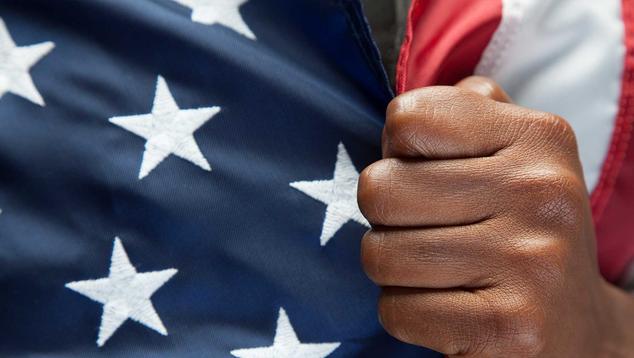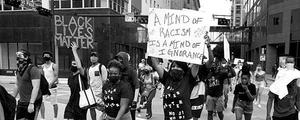WASHINGTON, D.C. -- There is no doubt that America is living through a time of national crisis. At Gallup, we have been diligently thinking through how we can make our contribution to the national refocus on the vast systemic disparities that ruthlessly fence in too many Black Americans and shape the Black experience across this country.
Many statements have been sound-boarded and pitched out of C-suites to meet this moment in racial history in America. Across the Gallup tribe, we feel that the only real and lasting contribution our analytics firm can make is to do exactly what we have always done since the 1930s, but with a renewed commitment and dedication to the challenges at hand.
Documenting racial disparities and racism across American society is nothing new for our company or its surveys. The first time we asked about racism in America was in 1939 when a majority (57%) of Americans supported Eleanor Roosevelt's protest resignation from the Daughters of the American Revolution for their decision to ban the performance of Marian Anderson, a Black American contralto.
But what we have not done is apply the same rigor to tracking how Black Americans are experiencing life across America, as we do when we have partnered with international organizations to track the United Nations' Sustainable Development Goals across the developing world.
Our commitment, through the important work of the newly-created Gallup Center on Black Voices, is to report on the Black experience as it is lived across America along the key areas where disparities have most negatively impacted life outcomes.
A Data Point Is a Photograph; a Trend Is a Motion Picture
Over the decades, Gallup has asked tens of thousands of questions on hundreds of topics. One thing we have learned is that while the latest news focus may be of acute interest, the greatest value in reporting on the will of a society is in long-term tracking. As we studied our own archives closely, it was apparent that the most useful metrics on race relations and the Black experience in America were always those items that were tracked over time.
One of the main objectives of the Gallup Center on Black Voices is to revisit those long-term trends with a focus on studying Black Americans in particular, as well as the general population's perception on how far America has -- or has not -- come in achieving equity in opportunity and life outcomes across racial and ethnic groups.
In addition to focusing on historical trends, we will also continue to use the online, probability-based Gallup Panel and RDD Phone Surveys to measure U.S. attitudes on race among Black Americans and other subgroups. Gallup has also conducted, and will continue to conduct, representative mail surveys designed to study communities most at risk of experiencing disparities in outcomes, including The State of Opportunity in America, which we have issued since 2017 with our partners at the Center for Advancing Opportunity and the Thurgood Marshall College Fund.
Cringeworthy Language for a Cringeworthy National Discourse
Our team has often delved into our dusty volumes of public opinion toplines dating back as far as the 1930s on perceptions of some of the most contentious race-related issues of the times. While the data in these archives are often fascinating, it was our Director of U.S. Social Research who pointed out that "the question wording can sometimes tell us more about the times than the responses."
In that vein, we are often confronted with the decision of whether to report the facts as collected or adjust our reporting language to converge with today's sensibilities and consciousness. Any poll or data point is ultimately just one snapshot in the historical continuum. Words take on different meanings to different generations, and sensibilities, sensitivities and consciences all change.
In our effort to serve as a resource for documenting these moments in history and American public life, we will always report the question we asked the way we asked it then, even if we don't like the word choices given to describe Black Americans or other groups in our polls. We do this for the sake of transparency and accuracy but also with great deliberation knowing that terms and symbols created in the language of any era are mostly a reflection of the prevailing language used at the time.
I am often reminded of the words of the late Congresswoman Shirley Chisholm: "We must reject not only the stereotypes that others hold of us, but also the stereotypes that we hold of ourselves."
The Terminology of Defining Groups Today -- Nobody Knows My Name
In the modern era, we took a different approach and began asking Black Americans themselves how they would like to be identified. More than six in 10 Black Americans tell Gallup it does not matter to them whether people refer to them as "Black" or "African-American." This one piece of data, although simple, is perhaps a profound signal for a need to focus less on semantics and verbiage and more on life outcomes, experiences and disparities therein.
A Mission for a New Generation of Gallup Researchers
Moving forward, what readers can expect from our team at the Gallup Center on Black Voices and beyond is what you have always expected from Gallup: a resource to accurately measure, track and objectively report on the will of Black Americans and their varied experiences across the United States.
While we will always remain non-partisan and avoid advocacy, we are unapologetic about our commitment to using the research tools we have to highlight, track and inform the public and leaders on the disparities of life outcomes experienced by Black people across the United States. Anything short of that would be to ignore the decades of our own data highlighting these differences in the lives of Black Americans.
Research alone cannot solve the historic challenge facing America. Still, we know from decades of our own work that reliable, objective and trusted information is always a key tool for addressing social ailments and policy failures. The mission of the Gallup Center on Black Voices is to serve as America's source of information about the state of racial equity in America. As our founder, George Gallup, often stated, "If democracy is about the will of the people, someone should go find out what that will is!"




